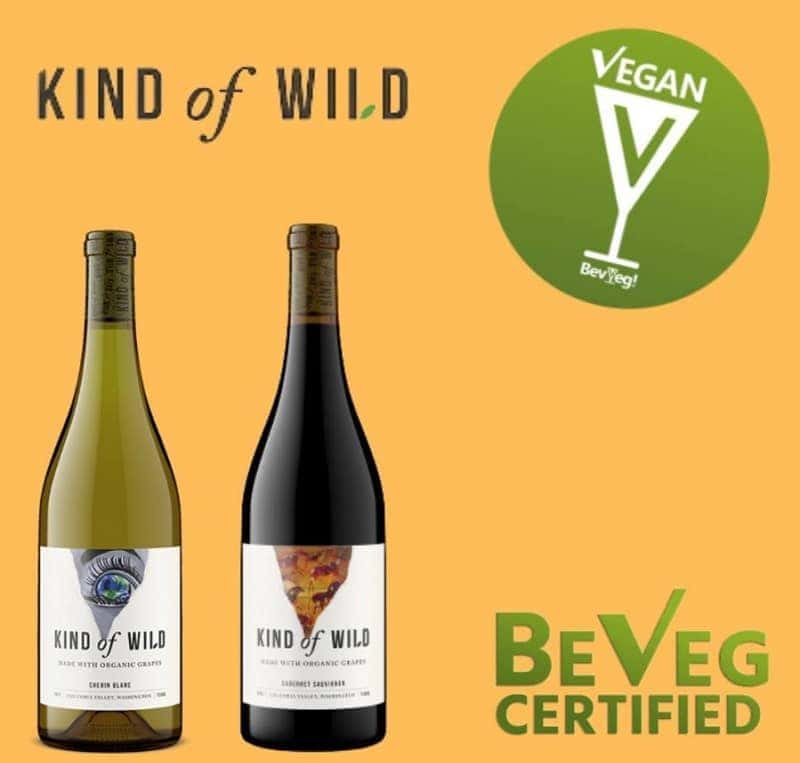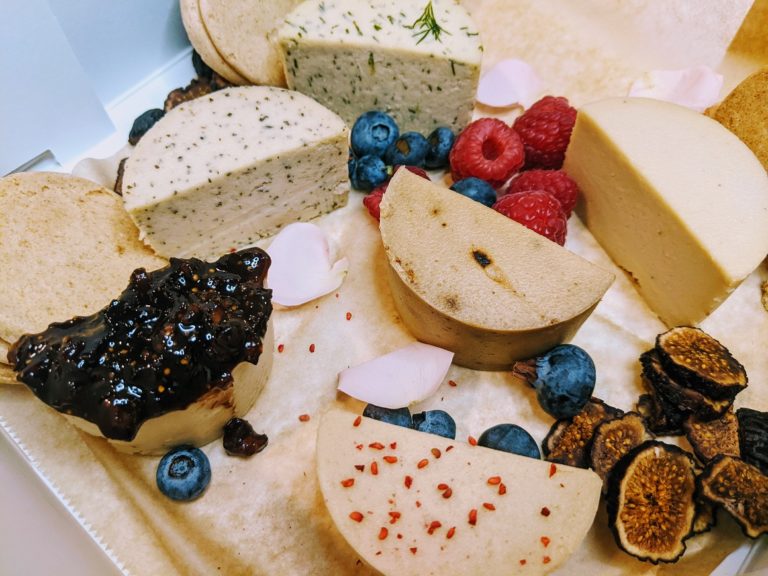Vegan Wine Guide: 9 Best Vegan Wines to Try in 2026
Is it safe to say you’ve stood confused in the wine aisle at least once, wondering where to find vegan vino? Navigating the beverage world is one of the most significant challenges for a vegan. Many people assume all wines are 100% plant-based — they’re just made from grapes, right?
Surprisingly not.
Most wines undergo a clarifying process using animal-derived agents before being bottled. With different labeling requirements than other foods, it can be hard to decipher whether the bottle you’re holding is vegan-friendly.
How can you be sure your wine is vegan, let alone eco-friendly? Is there such a thing as organic vegan wine? Will you be able to find a favorite brand that meets your ideals, is affordable, and tastes great? All these questions are enough to make your head spin — minus a hangover.
Here are the ins and outs of vegan wine, what makes it 100% plant-based, and brands worth trying in 2025. Get ready to uncork and imbibe, knowing plenty of options are available for you to swirl and sip.

This article contains affiliate links and Veggies Abroad is a member of Amazon Services LLC Associated Program. At no cost to you, I may earn a small commission if you make a purchase — this helps keep Veggies Abroad churning out free content! For an explanation of our advertising policy, click here.
The Best Vegan Wines to Buy Right Now
1. Kind of Wild Wines
Types of wine it carries: Sauvignon blanc, chardonnay, malbec, cabernet, sparkling, rose, and wine bundles.
Where to buy: Online
Average price: $26
Kind of Wild Wines sources grapes from family-owned, certified organic vineyards and avoids fining with animal-derived ingredients. It stands apart from other brands because it doesn’t work with large-scale growers and cooperatives. Kind of Wild Wines donates 1% of its yearly revenue to environmental organizations. Additionally, this vegan wine brand plants a tree for every order. It also allows customers to add a donation during ordering, which gets dispersed to its partner organizations, such as the Organic Farming Research Foundation and One Tree Planted.
Shop Kind of Wild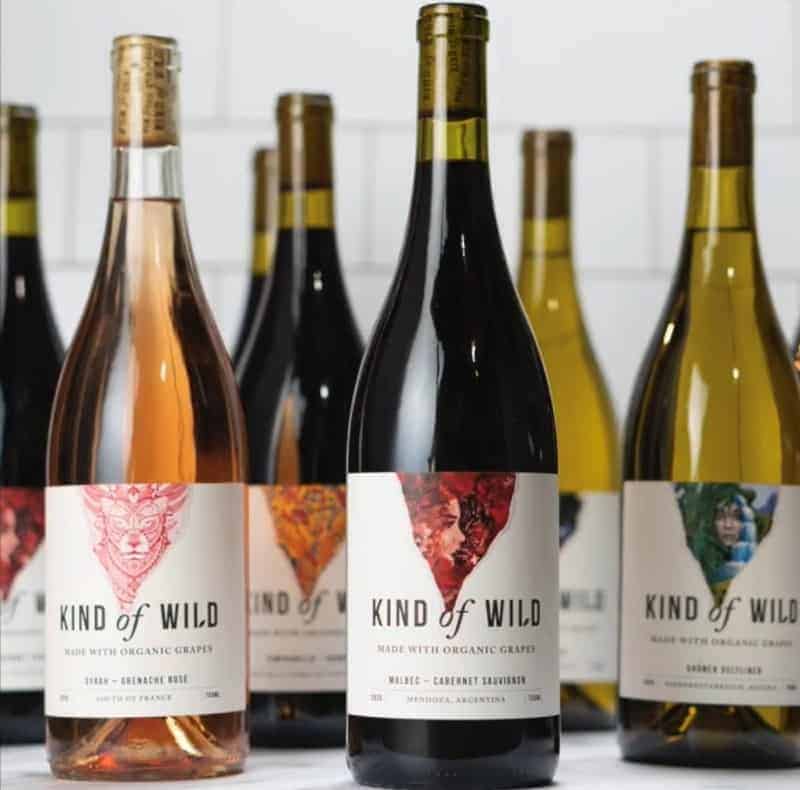
2. Tinto Amorio
Types of wine it carries: Orange-flavored natural wines and spritzers inspired by summers in Spain
Where to buy: Online or at select stores in California, New York and New Jersey
Average price: $30-$110
Tinto Amorio produces an organic vegan wine with little intervention, including pasteurization, flavoring, or synthetic additives. It’s classified as a natural artisanal brand from California, so vegans can rest assured there is no fining process to worry about. The wines themselves are reminiscent of summers in Spain. However, perhaps even more appealing, Tinto Amorio is minority-owned and gives 5% of its sales to local food banks. So far, the brand has provided over 100,000 meals to Los Angeles and Orange counties’ hungry population.
Shop Tinto Amorio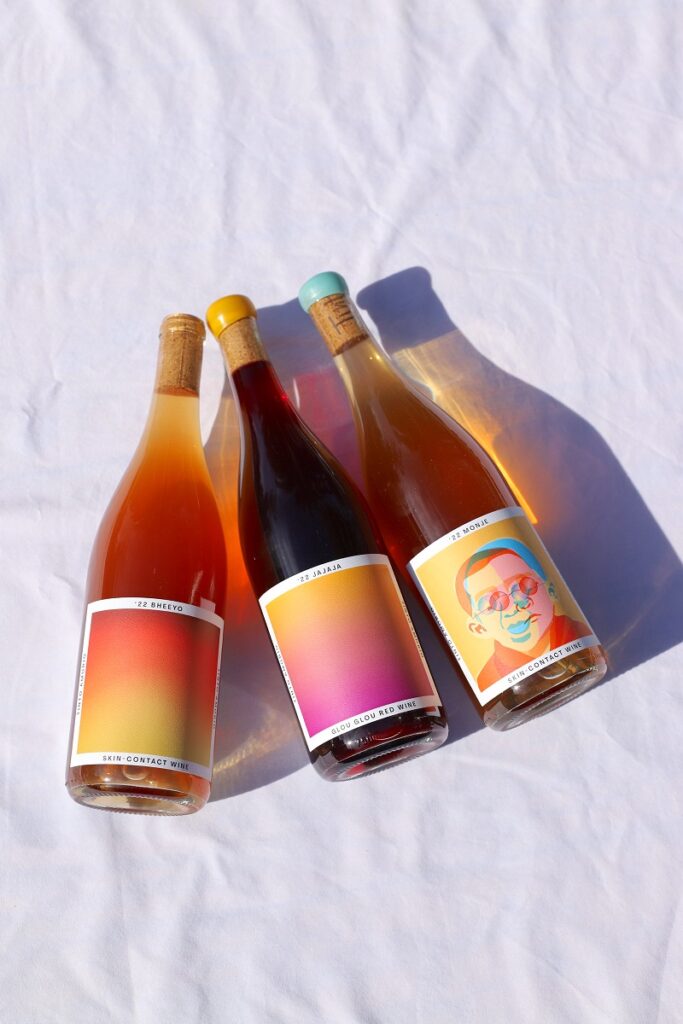
3. Protector Cellars
Types of wine it carries: White, red, rose, sparkling, and Champagne canned wines
Where to buy: Online
Average price: $53-$85 depending on the type of wine and number of cans in a pack
Protector Cellars was the first climate-positive winery worldwide and boasts a delicious line of 100% plant-based canned vegan wines. Although you can buy packs of wine in a single flavor, you can also create a variety pack with your favorites. Canned wine has become increasingly popular as an on-the-go option. Like Kind of Wild Wines, Protector Cellars will plant a tree for every purchase made on its website. Eco-conscious wine enthusiasts will also appreciate how it ships its wine in sustainable packaging and by carbon-neutral shipping.
Shop Protector Cellars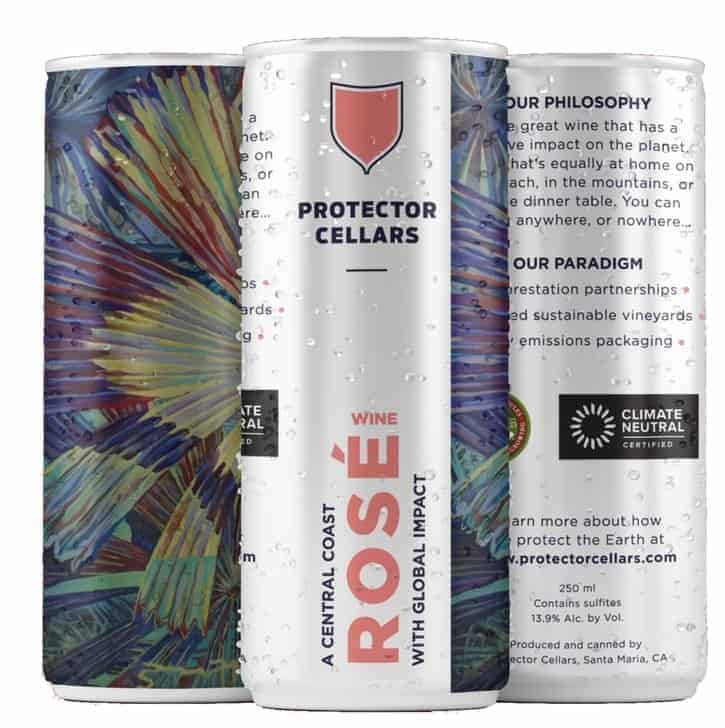
4. Frey Vineyards
Types of wine it carries: Reds and whites
Where to buy: Online
Average price: $9-$50
Frey Vineyards is a third-generation winery, producing vegan and gluten-free wines since 1980. The brand takes more of a hand-off approach, allowing the wine to ferment independently. Frey Vineyards only uses naturally occurring bentonite in its fining process for white wines — its red wines are unrefined. The brand also has a free Wine Club membership program, offering $20-$30 off pricing.
Shop Frey Vineyards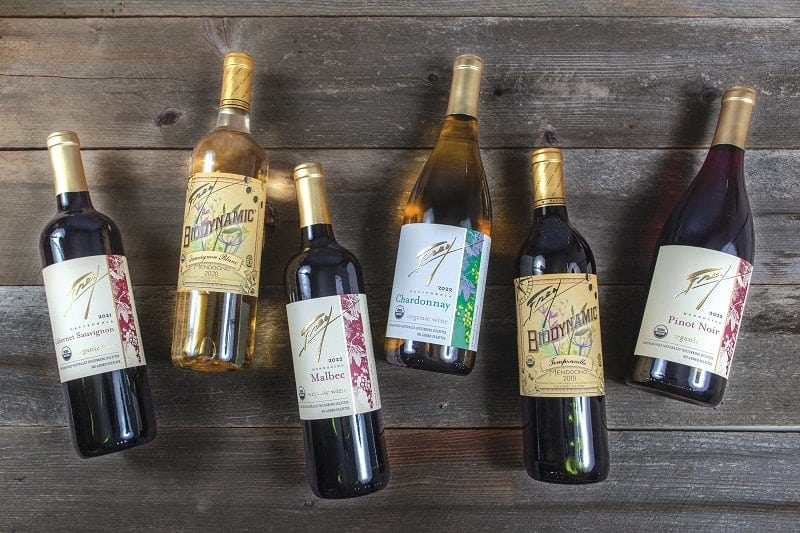
5. Red Truck Wines
Types of wine it carries: Cabernet, pinot noir and pinot grigio
Where to buy: Online and select restaurants, bars, hotels and other retailers
Average price: $16
Sonoma, California-based Red Truck Wines released its first red blend in 2002 — a smooth, round combination of Syrah, Cabernet Franc, Mourvedre, Petite Syrah, and Grenache. Eventually, its winemakers began producing vegan cabernet sauvignon, pinot noir, and pinot grigio. How has Red Truck Wines sustained its popularity for so long? Its original winemaker, John Allbaugh, is running the show.
Shop Red Truck Wines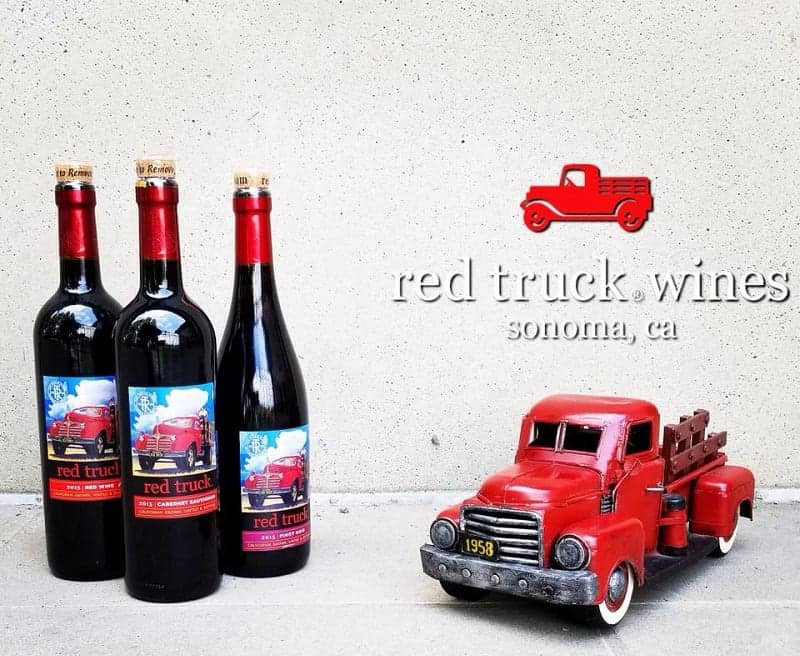
6. Avaline
Types of wine it carries: Rose, pinot noir, cabernet sauvignon, sauvignon blanc, sparkling and dry white
Where to buy: Online and various retailers nationwide
Average price: $24-$240
Avaline Wine was founded by actress Cameron Diaz and entrepreneur Katherine Power as the friends bonded over their love for wine. It launched in 2020 and has already garnered over $20 million in sales. It also earned the No. 2 spot as the best vegan wine brand in the U.S. and No. 1 in the organic premium category. The brand prides itself on its transparency, listing all ingredients on its website. You can also read more about Avaline’s producers, including its sustainability measures to provide superior vegan wine at an affordable price.
Shop Avaline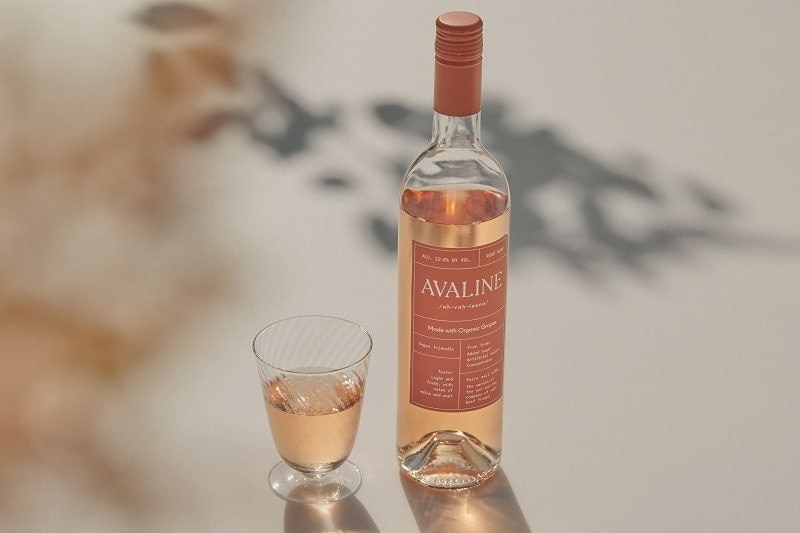
7. Our Daily Wines
Types of wine it carries: Organic cabernet, red blend, chardonnay, and albarinio
Where to buy: Online and from select vendors nationwide
Average price: $11
Our Daily Wines has been around since 1989, delivering sustainable and delicious organic vegan wines. The brand uses cover crops and ladybugs as pest repellants to ensure its grapes are healthy and bug-free. Although it does not have a wine club for its biggest fans, you can purchase your preferred type in a recurring subscription with 5% savings per order. Simply choose a frequency of one, two, or three months.
Shop Our Daily Wines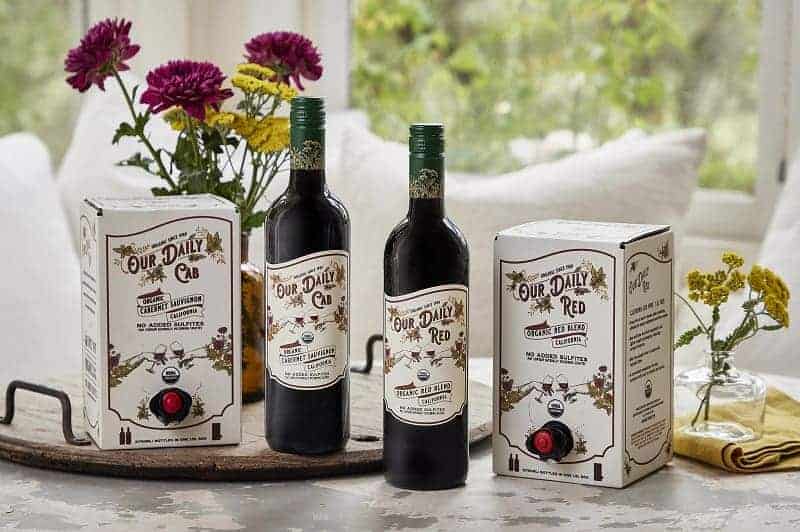
8. Moose Mountain Vineyards
Types of wine it carries: Reds, whites, & Pet-Nat
Where to buy: Online, select restaurants, bars, & other retailers
Average price: $35 – $120
Moose Mountain Vineyards is located on the Central Coast of California with vineyards in San Martin and Paso Robles. The winery focuses on the organic production of exceptional grape varietals and maintaining the vines in a natural, traditional way. The vineyards are managed “by hand” from the pruning in February to the fruit drop and leaf pull in late spring and early summer. The team behind Moose Mountain believes that making wines with sustainable and organic practices is not only important, but it is also their responsibility. You can fine high quality Bordeaux blends and other unique varietals, Tannat, Malbec, Merlot and Pet-Nat styled wines.
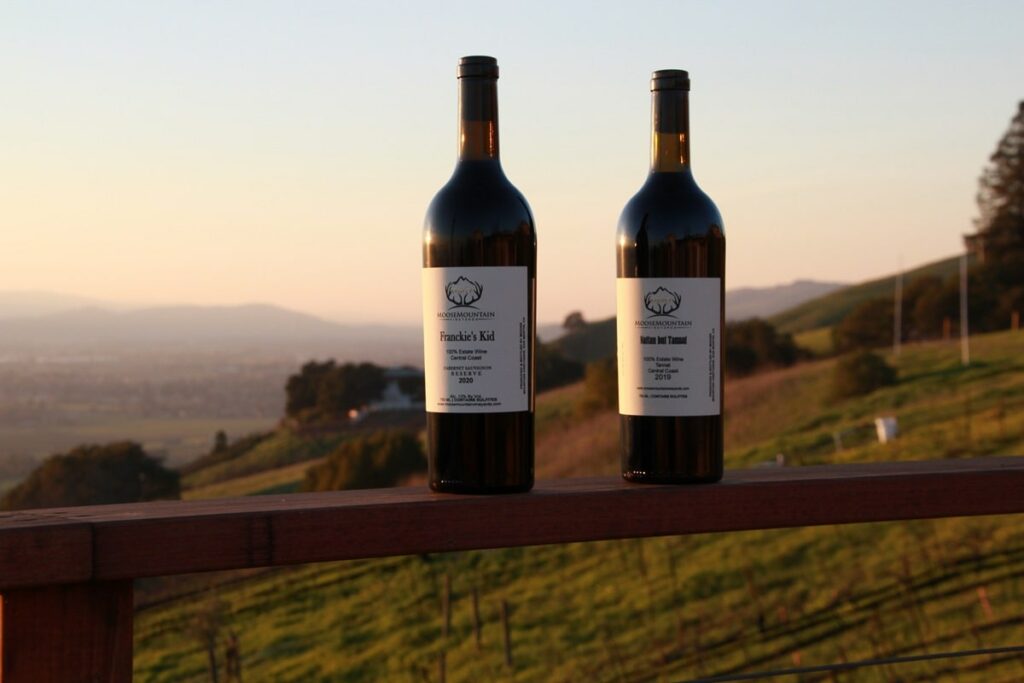
9. Querciabella
Types of wine it carries: Bâtard-Pinot, Chianti Classico, Camartina, and others
Where to buy: Online — currently ships to the U.S., Italy and Canada
Average price: $15-$150
Querciabella is a fine wine produced in the beautiful hilly region of Chianti, Italy. Recently, the brand decided to transition from biodynamic to vegan biodynamic, eliminating the use of animals and animal byproducts. The winery has grown from 40 to 75 hectares as climate change alters soil and harvests. The farmers use ample cover crops called Sovescio, which hinders soil erosion and dehydration. Quericiabella demonstrates the possibilities of creating excellent wine without animal fining agents or other ingredients.
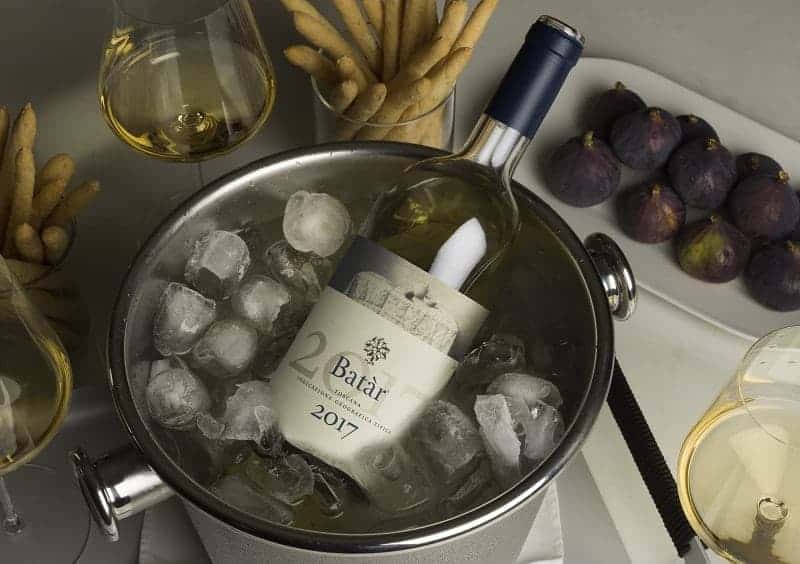
What’s in Wine That Makes It Not Vegan?
The wine-refining process requires using fining agents, which are most commonly non-vegan. They’re protein additives targeting a specific chemical compound.
Because they do not dissolve easily in wine or juice products, the additive is easy to remove along with whatever elements they attract. Phenolics — one type of protein fining agent — is particularly efficient in drawing tannins.
The most common non-vegan fining agents in wine include the following:
- Casein: Primary protein in milk used to refine white wines and sherries and reduce phenolic compounds — or bitterness.
- Gelatin: Derived from animal collagen — it aggressively strips the wine, reducing or modifying aromas, bitterness, and brown coloring.
- Egg whites: Aims to soften the quality of red wines — typically added to the wine barrel before bottling.
Isinglass is another animal-derived fining agent that will make you cringe. The agent comes from fish collagen and sturgeon bladders — a gentle additive for white and red wines. Because of its slightly fishy odor, winemakers use isinglass for about 30 to 60 days before bottling and distributing wine.

Vegan-Friendly Wine-Making Alternatives
Fear not, vegan wine lovers! Numerous wines undergo a 100% vegan-friendly refining process to satisfy your palette. For starters, winemakers may allow some time for the particles to drop to the bottom naturally. Otherwise, the more popular non-animal-protein agents include:
- Bentonite clay
- Activated charcoal
- Limestone
- Plant-derived proteins
- Vegetable plaques
- Silica gel
- Limestone
Gluten is another option for vegan-friendly wine. However, it poses a problem if you have sensitivities or celiac disease.
After removing the gross lees (sediment), wine may be stored with fine lees — yeast particles remaining from fermentation. This leaves the wine with a smoother flavor. White wines are stored for nine months, while winemakers usually store reds for 18 months before bottling.

How Do You Know if a Wine Is Vegan?
The vegan wine-making process sounds perfect — if only it could make up some of the three to four recommended daily servings of fruits and vegetables. Naturally, you’ll want to keep a few bottles on hand for having friends over or a quiet night in.
The wine industry isn’t particularly well-known for its transparency. For now, U.S. winemakers are not required to list the ingredients or nutrition information on the bottle. However, a 19-year petition to require proper labeling may come to fruition.
The wait leaves vegans in a lurch as they try to find animal-free wines. Some of the more obvious ways of locating the best vegan wines are as follows:
- Certification: BeVeg is an ISO-accredited certification organization setting benchmarks for wines to meet vegan standards globally.
- “Unfined” or “unfiltered” labeling: Look for these terms on the label to indicate whether the wine has undergone the fining process.
- Wine producer website: Visit the brand website to determine if it carries vegan-friendly wines.
- Google search: Do your research to determine if a producer uses animal-derived fining agents.
You can also download the mobile app Barnivore to make your vegan wine hunt easier. This database has nearly 58,000 entries for wine, beer, and liquor. Each beverage has been triple-checked to ensure they are vegan-friendly.
Of course, if you’re still wary, contact the producer and ask about their fining process directly. They will be able to give you a straight answer.
Additionally, if you’re ordering wine at a restaurant, you can ask your server if they carry vegan wine. Many establishments have begun catering to vegan patrons.
Does Vegan Wine Taste Different?
Although an acquired taste, wine flavoring is a balancing act of fruitiness, bitterness, and acidity — wine enthusiasts can’t get enough of it. You may wonder if vegan wines lose what makes the beverage so popular.
Despite the different fining processes, vegan wines maintain exemplary quality and taste. Many BeVeg-certified wines win awards and global recognition for excellence. Generally, few wine drinkers can taste much of a difference between vegan and non-vegan.
Likewise, vegan wines pair well with food regardless of whether it’s vegan-friendly. Everyone — including your non-vegan friends — will enjoy the taste.

Is All Organic Wine Vegan?
The U.S. Department of Agriculture certifies wine as organic if wineries grow the grapes without synthetic pesticides and fertilizers. Sulfites are also prohibited, while yeast and other ingredients must maintain organic certification.
However, some certified wine regulations allow producers to use non-vegan fining agents and additives despite having an organic seal. As such, it isn’t enough to go by labeling when shopping for vegan wine brands.
Not all vegan wines are natural, either. While vegan winemakers must stick to vegan fining ingredients only, natural wines forgo fining altogether.
A note about vegan packaging: Vegan wine brands must find an alternative to beeswax sealing and agglomerated corks, which often use milk-derived adhesive. Even if the wine was produced and refined through vegan practices, the bottling must adhere to total veganism.
Producers are becoming increasingly aware of the demand for vegan wines. Many have already begun swapping out animal-derived ingredients for vegan-friendly alternatives. However, a growing list of vegan wine brands is well ahead of the game. Here are eight bottles you’ll want to try
Drink Vegan Wine and Be Merry
Vegan wines are just like conventional wines without the animal-derived ingredients. They offer the same excellent taste but are safe for animal lovers to sip on. As veganism becomes more prevalent, you can now find 100% plant-based brands in grocery stores and restaurants.
Likewise, you might also be surprised at how accessible vegan wines are on the open road. Discover where you can buy them during your travels by checking out these travel guides for vegan wine-friendly establishments and events:
Where to Find Vegan Wine in Michigan
Cheers! Vegan Sparkling Wine and Champagne Guide
The Ultimate Austin Vegan Guide: Restaurants, Sights, & More
How to Spend Two Days in Traverse City As a Vegan


